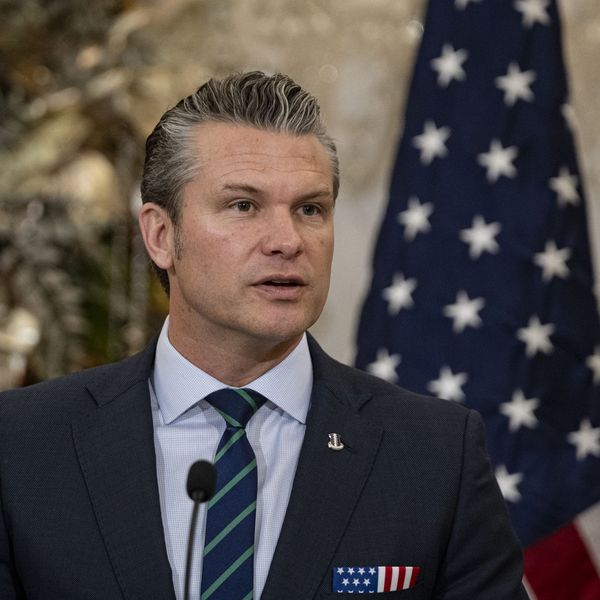
OpenAI makes ChatGPT, the world's most popular chatbot.
OpenAI Cuts 'Military and Warfare' Ban From Permissible Use Policy
"Given the use of AI systems in the targeting of civilians in Gaza, it's a notable moment to make the decision to remove the words," warned one policy analyst.
ChatGPT maker OpenAI this week quietly removed language from its usage policy that prohibited military use of its technology, a move with serious implications given the increase use of artificial intelligence on battlefields including Gaza.
ChatGPT is a free tool that lets users enter prompts to receive text or images generated by AI.The Intercept's Sam Biddle reported Friday that prior to Wednesday, OpenAI's permissible uses page banned "activity that has high risk of physical harm, including," specifically, "weapons development" and "military and warfare."
Although the company's
new policy stipulates that users should not harm human beings or "develop or use weapons," experts said the removal of the "military and warfare" language leaves open the door for lucrative contracts with U.S. and other militaries.
"Given the use of AI systems in the
targeting of civilians in Gaza, it's a notable moment to make the decision to remove the words 'military and warfare' from OpenAI's permissible use policy," Sarah Myers West, managing director of the AI Now Institute and a former AI policy analyst at the Federal Trade Commission, told The Intercept.
"The language that is in the policy remains vague and raises questions about how OpenAI intends to approach enforcement," she added.
An OpenAI spokesperson told Common Dreams in an email that:
Our policy does not allow our tools to be used to harm people, develop weapons, for communications surveillance, or to injure others or destroy property. There are, however, national security use cases that align with our mission. For example, we are already working with [the Defense Advanced Research Projects Agency] to spur the creation of new cybersecurity tools to secure open source software that critical infrastructure and industry depend on. It was not clear whether these beneficial use cases would have been allowed under "military" in our previous policies. So the goal with our policy update is to provide clarity and the ability to have these discussions.
As AI advances, so does its weaponization. Experts warn that AI applications including lethal autonomous weapons systems, commonly called "killer robots," could pose a potentially existential threat to humanity that underscores the imperative of arms control measures to slow the pace of weaponization.
That's the goal of nuclear weapons legislation introduced last year in the U.S. Congress. The bipartisan Block Nuclear Launch by Autonomous Artificial Intelligence Act—introduced by Sen. Ed Markey (D-Mass.) and Reps. Ted Lieu (D-Calif.), Don Beyer (D-Va.), and Ken Buck (R-Colo.)—asserts that "any decision to launch a nuclear weapon should not be made" by AI.
An Urgent Message From Our Co-Founder
Dear Common Dreams reader, The U.S. is on a fast track to authoritarianism like nothing I've ever seen. Meanwhile, corporate news outlets are utterly capitulating to Trump, twisting their coverage to avoid drawing his ire while lining up to stuff cash in his pockets. That's why I believe that Common Dreams is doing the best and most consequential reporting that we've ever done. Our small but mighty team is a progressive reporting powerhouse, covering the news every day that the corporate media never will. Our mission has always been simple: To inform. To inspire. And to ignite change for the common good. Now here's the key piece that I want all our readers to understand: None of this would be possible without your financial support. That's not just some fundraising cliche. It's the absolute and literal truth. We don't accept corporate advertising and never will. We don't have a paywall because we don't think people should be blocked from critical news based on their ability to pay. Everything we do is funded by the donations of readers like you. Will you donate now to help power the nonprofit, independent reporting of Common Dreams? Thank you for being a vital member of our community. Together, we can keep independent journalism alive when it’s needed most. - Craig Brown, Co-founder |
ChatGPT maker OpenAI this week quietly removed language from its usage policy that prohibited military use of its technology, a move with serious implications given the increase use of artificial intelligence on battlefields including Gaza.
ChatGPT is a free tool that lets users enter prompts to receive text or images generated by AI.The Intercept's Sam Biddle reported Friday that prior to Wednesday, OpenAI's permissible uses page banned "activity that has high risk of physical harm, including," specifically, "weapons development" and "military and warfare."
Although the company's
new policy stipulates that users should not harm human beings or "develop or use weapons," experts said the removal of the "military and warfare" language leaves open the door for lucrative contracts with U.S. and other militaries.
"Given the use of AI systems in the
targeting of civilians in Gaza, it's a notable moment to make the decision to remove the words 'military and warfare' from OpenAI's permissible use policy," Sarah Myers West, managing director of the AI Now Institute and a former AI policy analyst at the Federal Trade Commission, told The Intercept.
"The language that is in the policy remains vague and raises questions about how OpenAI intends to approach enforcement," she added.
An OpenAI spokesperson told Common Dreams in an email that:
Our policy does not allow our tools to be used to harm people, develop weapons, for communications surveillance, or to injure others or destroy property. There are, however, national security use cases that align with our mission. For example, we are already working with [the Defense Advanced Research Projects Agency] to spur the creation of new cybersecurity tools to secure open source software that critical infrastructure and industry depend on. It was not clear whether these beneficial use cases would have been allowed under "military" in our previous policies. So the goal with our policy update is to provide clarity and the ability to have these discussions.
As AI advances, so does its weaponization. Experts warn that AI applications including lethal autonomous weapons systems, commonly called "killer robots," could pose a potentially existential threat to humanity that underscores the imperative of arms control measures to slow the pace of weaponization.
That's the goal of nuclear weapons legislation introduced last year in the U.S. Congress. The bipartisan Block Nuclear Launch by Autonomous Artificial Intelligence Act—introduced by Sen. Ed Markey (D-Mass.) and Reps. Ted Lieu (D-Calif.), Don Beyer (D-Va.), and Ken Buck (R-Colo.)—asserts that "any decision to launch a nuclear weapon should not be made" by AI.
- Noam Chomsky Speaks on What ChatGPT Is Really Good For ›
- Experts Demand 'Pause' on Spread of Artificial Intelligence Until Regulations Imposed ›
- White House Deal for Voluntary AI Safeguards Called 'Great Step' But 'Not Enough' ›
- Experts Urge Action to Mitigate 'Risk of Extinction From AI' ›
- Experts Fear Future AI Could Cause 'Nuclear-Level Catastrophe' ›
- The AI-Robot Wars: Is Dystopian Science Fiction Becoming a Reality? ›
ChatGPT maker OpenAI this week quietly removed language from its usage policy that prohibited military use of its technology, a move with serious implications given the increase use of artificial intelligence on battlefields including Gaza.
ChatGPT is a free tool that lets users enter prompts to receive text or images generated by AI.The Intercept's Sam Biddle reported Friday that prior to Wednesday, OpenAI's permissible uses page banned "activity that has high risk of physical harm, including," specifically, "weapons development" and "military and warfare."
Although the company's
new policy stipulates that users should not harm human beings or "develop or use weapons," experts said the removal of the "military and warfare" language leaves open the door for lucrative contracts with U.S. and other militaries.
"Given the use of AI systems in the
targeting of civilians in Gaza, it's a notable moment to make the decision to remove the words 'military and warfare' from OpenAI's permissible use policy," Sarah Myers West, managing director of the AI Now Institute and a former AI policy analyst at the Federal Trade Commission, told The Intercept.
"The language that is in the policy remains vague and raises questions about how OpenAI intends to approach enforcement," she added.
An OpenAI spokesperson told Common Dreams in an email that:
Our policy does not allow our tools to be used to harm people, develop weapons, for communications surveillance, or to injure others or destroy property. There are, however, national security use cases that align with our mission. For example, we are already working with [the Defense Advanced Research Projects Agency] to spur the creation of new cybersecurity tools to secure open source software that critical infrastructure and industry depend on. It was not clear whether these beneficial use cases would have been allowed under "military" in our previous policies. So the goal with our policy update is to provide clarity and the ability to have these discussions.
As AI advances, so does its weaponization. Experts warn that AI applications including lethal autonomous weapons systems, commonly called "killer robots," could pose a potentially existential threat to humanity that underscores the imperative of arms control measures to slow the pace of weaponization.
That's the goal of nuclear weapons legislation introduced last year in the U.S. Congress. The bipartisan Block Nuclear Launch by Autonomous Artificial Intelligence Act—introduced by Sen. Ed Markey (D-Mass.) and Reps. Ted Lieu (D-Calif.), Don Beyer (D-Va.), and Ken Buck (R-Colo.)—asserts that "any decision to launch a nuclear weapon should not be made" by AI.
- Noam Chomsky Speaks on What ChatGPT Is Really Good For ›
- Experts Demand 'Pause' on Spread of Artificial Intelligence Until Regulations Imposed ›
- White House Deal for Voluntary AI Safeguards Called 'Great Step' But 'Not Enough' ›
- Experts Urge Action to Mitigate 'Risk of Extinction From AI' ›
- Experts Fear Future AI Could Cause 'Nuclear-Level Catastrophe' ›
- The AI-Robot Wars: Is Dystopian Science Fiction Becoming a Reality? ›

